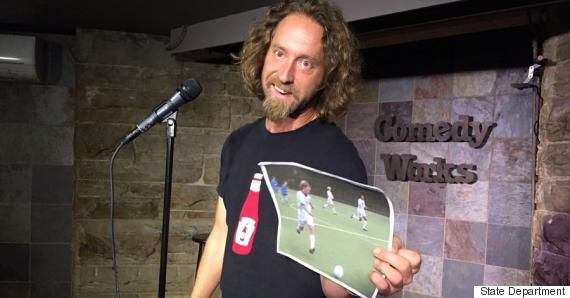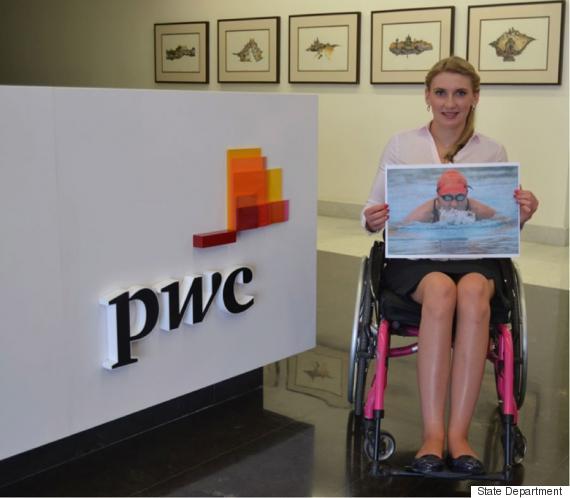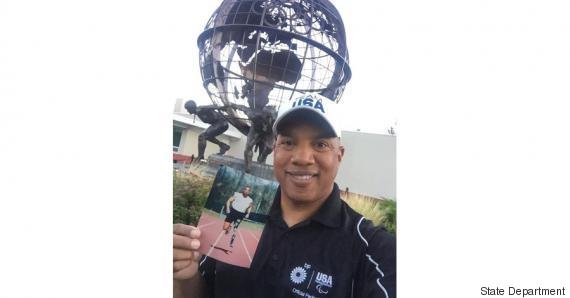
Josh Blue, who was featured in the Department's Paralympians #WithoutLimits Campaign, competed with the U.S. Soccer Team at the 2004 Paralympic Games in Athens. He is now a nationally renowned stand-up comedian & 2006 winner of NBC's Last Comic Standing.
October is National Disability Employment Awareness Month and this year's theme is "Inclusion Works." This awareness month aims to educate society about disability employment issues while celebrating the many and varied contributions of workers with disabilities in the United States.
One of the biggest challenges disabled people face is our invisibility in the community and in the world. The less people see, know, or experience persons with disabilities the more they accept negative stereotypes as fact. Many of the barriers disabled people experience in seeking employment and inclusion are the result of fear, ignorance, and low expectations, when, in fact, their disabilities do not hinder them from achieving excellence in the workplace. There are few things more compelling than when human beings perform at the highest levels of their trade. Be it sport, education, arts, music, culinary arts, literature, manufacturing, craftsmanship or science -- achieving standards of excellence is celebrated in our society.

Vladyslava Kravchenko is a para-swimming athlete from #Malta. She also works as an accountant at the Tax and Legal Service Line at PwC Malta. She was featured in the State Department's Paralympians #WithoutLimits campaign during the 2016 Paralympic games. [State Department photo]
For example, when London was preparing to host the 2012 Summer Paralympic Games, UK broadcaster Channel 4 developed creative television programming to educate its citizens about Paralympic athletes and their sports. The network also conducted an international talent search to identify and train presenters and commentators with disabilities to cover the Games. For the Rio 2016 Summer Paralympic Games, 58 percent of Channel 4's Paralympic Games commentators had disabilities and another 26 disabled staff worked on the production team.
The UK's Channel 4 coverage of the 2012 Paralympic Games helped change the face of disability in that country. Record breaking numbers of Brits watched coverage of the Games on television. According to research polls, UK citizens reported having much more favorable views about disabled people after the Paralympic Games verses before this landmark media coverage.
Examples like this demonstrate that social and economic empowerment of people with disabilities requires strong cooperation by the public, private, and civil society sectors. Policies protecting disabled people from discrimination in the job application, interview, hiring, and promotion process are necessary to break down barriers in this area. Robust enforcement measures also bring change more quickly. We have been working with U.S. corporations, multinational companies, world economic bodies, and the small business sector which is absolutely necessary to begin to make systemic change.
In the lead up to the 2016 Paralympic Games in Rio de Janeiro, the U.S. Department of State, in collaboration with the International Paralympic Committee, launched the Paralympians #WithoutLimits campaign in recognition of the Convention on the Rights of Persons with Disabilities (CRPD). In particular the campaign focused on Article 27, which recognizes the right of persons with disabilities to work, on an equal basis of others in an inclusive and accessible workplace. With an estimated global unemployment rate of more than 80 percent for people with disabilities, the campaign highlighted past, current, and aspiring Paralympians from around the world whose professional careers include scientists, lawyers, doctors, government leaders, accountants, financial consultants, and marketing and sales.

John Register is a U.S. veteran and Paralympic athlete who competed at the 1996 and 2000 Paralympic Games. [State Department photo]
Employing disabled people must be part of the broader diversity efforts in our workplaces. It also makes good business sense to hire us because businesses that employ people with disabilities experience improved productivity, increased retention, and increased profitability by tapping into new talent and markets. Disabled people make up 15 percent of the world's population -- that's one billion people -- which makes us the largest minority constituency. Hiring people with disabilities will ensure that we are fully utilizing the talents of all our citizenry in the work of U.S. foreign policy.
About the Authors: Judith Heumann serves as the Special Advisor for International Disability Rights and Ann Cody serves as a Senior Foreign Affairs Officer in the Office of Special Advisor for International Disability Rights at the U.S. Department of State.
For more information:
Check out the U.S. Department of Labor's Office of Disability Employment Policy's resources for employers and job seekers with disabilities.
Read other DipNote blog entries about our work promote disability rights around the world.
Read President Obama's National Disability Employment Awareness Month proclamation.
Follow Special Advisor Judith Heumann on Facebook and @IntDisablity on Twitter.
Learn more about the U.S. Department of State's efforts to advance disability rights around the world.
